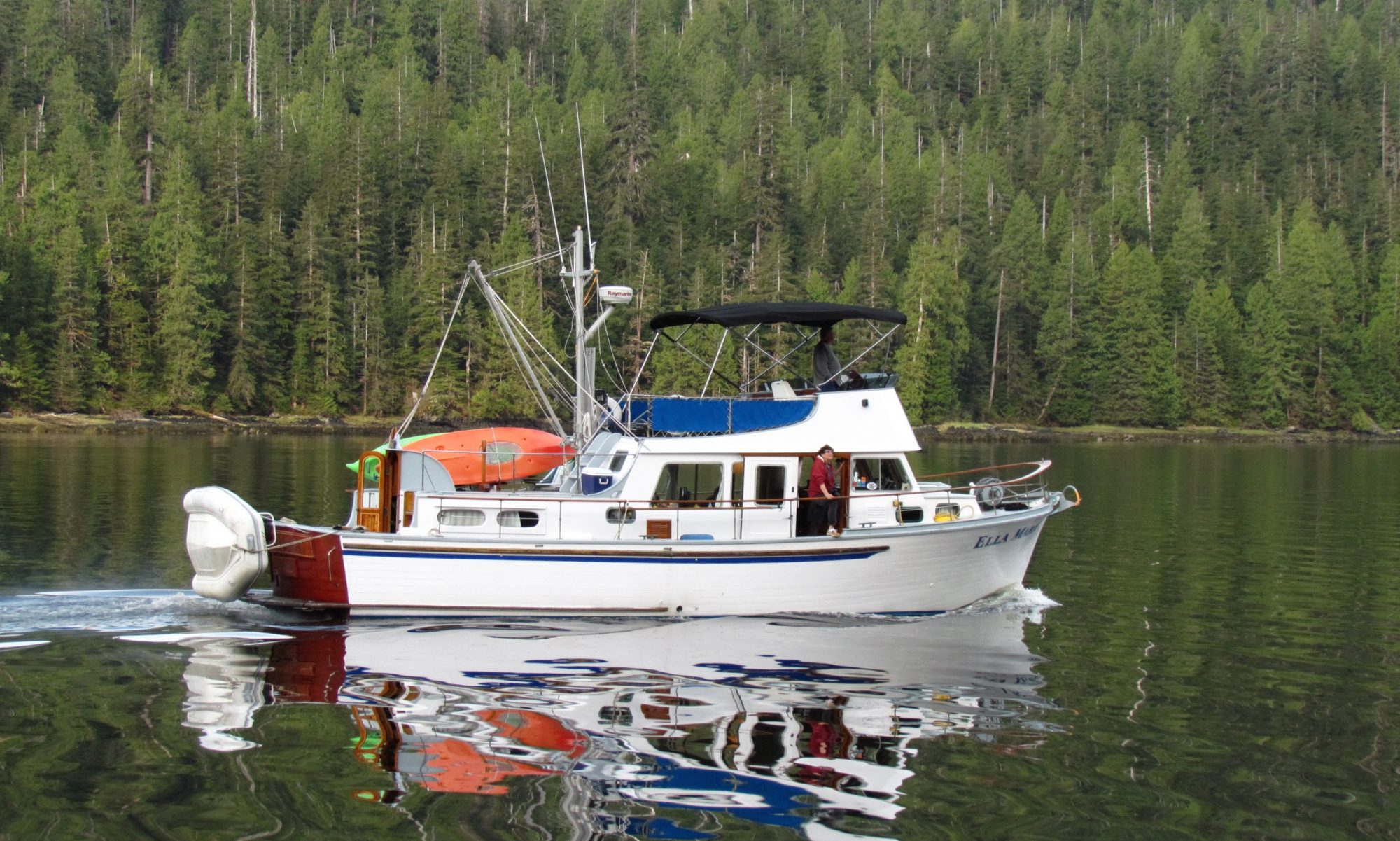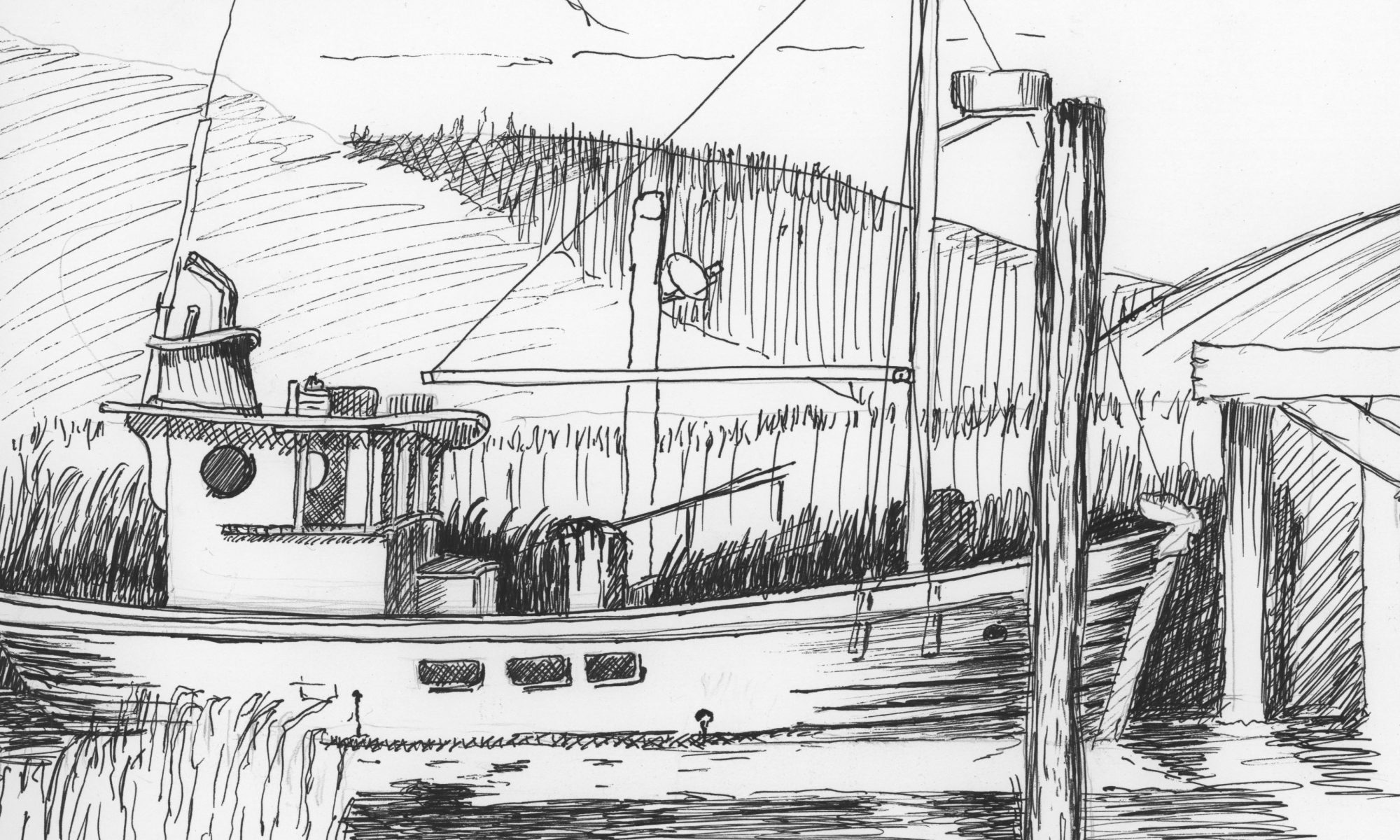“Hey mom, da ya suppose it would be alright if I joined Cub Scouts.”
“I’ll talk to your dad, but I don’t see why not. We should be able to swing it.”
“Swing it” meant that they had to money to pay whatever it cost without me wandering up and down old highway 99 with a gunny sack looking for beer and pop bottles.
Dad got home, cleaned up and we sat around the dinner table. After we were well into the meal my request for Cub Scouts went up the chain of command to my dad. Mom told dad what she knew about Cub Scouts.
“Lillian had Gordy in Cub Scouts, said it was a pretty good deal.”
Dad considered what his role in this whole thing might be and decided it wouldn’t involve him at all.
“Yeah, it’ll be ok I guess.”
At this point dad put one of his massive hands on the table with one finger pointed at me.
“Dicky, either you do or your don’t.”
Now this Yoda-like statement may make no sense to you at all, but it made perfect sense to me. It mean that if you were going to do something, don’t make a hash of it. Do it right.
Phone calls were made, information gathered and a road trip planned for later in the week.
So, it was with some excitement that I got into our little brown ’52 Ford with my dad. We were headed out near California Creek to Al Freeman’s place. Apparently he was the head man of the small blue army. My dad had on his Filson jacket instead of his plaid jacket befitting the importance of this trip.
In truth, for me, this was big stuff. When we crossed Dakota Creek I didn’t even try and look to see what was happening at the shipyard, my eyes were trying to see the words to the Oath. I had to get it right or my career would be jinxed from the start.
I was about to take an oath. This was of no small importance. I have to say it was weighing heavily on me. The first part, the part that terrified me, was not remembering. It wasn’t that long, but could I perform under pressure. The second part was the meaning. It was serious stuff, it meant you had to man up.
So, we got there, off to the left of the California Creek bridge where it goes off there toward where Ted McAllister lived. Well, within a hundred meters give or take.
We went up to the back porch and I knocked. It was my deal, so I figured I’d better step up.
The screen door opened, and a big hand reached out, a matching one grabbed it and shook it.
“Hi Bob.”
“Hi Al.”
“Who’s this fella?”
“Dicky.”
Most business in our community got done over a pot of coffee and this was no exception. We sat at the kitchen table as dad and Al engaged in companionable conversation as only people who had known each other for a long time can enjoy.
I was not the first boy to sit in that kitchen, both his own and the lads who wanted to be cubbies. So, Mr. Freeman had a finely tuned sense of when a wiggling kids couldn’t wait any longer.
“Well, Robert, looks like we’ve got someone here who wants to be a Cub.”
“Yup, his idea.”
“Has he memorized the Scout Oath?”
Two sets of eyes looked at me curiously and I slid off my chair and raised my hand in the cub scout salute. I knew the hand thing, two fingers up, two folded held by the thumb. I was ready and knew there wasn’t a moment to lose.
“On my honor I will do my best to do my duty to God and my country and to obey the Scout Law; to help other people at all times; to keep myself physically strong, mentally awake, and morally straight.”
“Easy there Dicky, let me stand up and get the form. We’ll fill it out and then you can do the oath.”
So, with the form filled out, and my dad standing at my side, I did the Scout Oath and became the newest member of pack 25, Blaine, Washington.
With some trepidation I told my mom I was going to need a Cub Scout shirt.
“I figured as much.”
“New” was a luxury we didn’t always experience growing up. The Stephanson and Walsh clans had 12 families between them. The result was I had 28 first cousins. Generally someone in the family had what you needed. In this case my cousin Gordy Pullar down in Bellingham had a serviceable shirt. I had to wait until someone was going down there to get it, but eventually it arrived. (Some of you might know Gordy, he went on to get a PhD and taught at U Alaska).
Sometimes you get lucky when you get used stuff. Like when you buy a skiff and they throw in all the extra lines and a couple crab pots. In my case my new shirt was old school cotton and heavy. It felt good wearing it. The new ones were some polyester blend that felt like crap wearing them, they slid all over your body. Mom carefully removed the patches and put them in a cigar box for when I advanced through the ranks.
It wasn’t long before I received my orders. I was assigned to Den 2, Doris Deirks and Lela Hawkins’ command. The assignment pleased my mom ‘cause she knew ‘em. Hawkins lived across the street from the Unitarian Church and Dierks lived near the school at the north end of the old railroad grade.
We met after school once a week. On Cub Scout day I’d proudly wear my uniform. The meetings normally involved working on requirements or doing a craft project. About a half hour trying to keep us organized, an effort a bit like herding cats, and our Den Moms would throw up their hands and point outside. We’d tear around outside whooping and hollering until it was time for the ritual bonding of eating cup cakes together.
I was pretty proud when one after another those patches were sewn on my comfortable cotton Scout shirt. Maybe not as fast as other kids, but with Mrs. Hawkins and Mrs. Dierks checking those requirements and documenting each step we all moved forward.
Now in Blaine, there were many proud Cub Scout dens, each with their own history and legend. Mostly, they operated independently, but every so often they would come together in the basement of the Congregational Church for the great gathering, the Pack meeting.
I sit her now thinking of the pure innocence of those times. Watching the shadow play of the doctor removing a string of hot dogs from the patients stomach. Dens getting to hammer the bell for every scout in attendance. An activity sending glee into every kid and suffering to every parent. Calling the scouts to get their badges of rank and achievement. Learning about the connection between work and reward. It was pretty damned good stuff.
The Scout year had two giant events. One was the trip to the Fire Mountain Boy Scout camp at Silver Lake and the other was the Blue and Gold dinner.
For the Cub Scouts, Fire Mountain was a two night weekend event. We’d camp on the east side of the lake with all the dining and important buildings on the west side of the lake. This meant that three times a day we would run around the end of the lake to get in line for chow. The first time I ate there I tried to explain to the man in charge that cocoa should be made with milk, not water. He wasn’t interested. If I wanted real food, I’d have to wait for the Blue and Gold dinner.
The Blue and Gold dinner was pot luck. The long row of tables shoved together with white table cloths joining them together strained to hold the cornucopia of food. Moms were all proud of their kitchen and what it produced. Moms spent time cooking. It was labor intensive and did not include a phone call for take out. The Blue and Gold dinner had it all, scalloped potatoes, mashed potatoes, ham, salmon, baked beans, fresh cut beans and enough desserts to make every kid’s tummy feel insanely packed. Most times headed home from the dinner I’d fall asleep in the car and need to be dragged in to bed.
As part of our operational training for Cub Scouts, we had to go through water training. This was not a training that was easily available in Blaine. It required a drive down to the YWCA in Bellingham. Here, the brave cubbies of Blaine learned to do the crawl, back stroke, breast stroke, scissor kick and all the rest. Every kid in town knew how to swim. It was part of our DNA and Cub Scout swim lessons put the finishing touch on what Birch Bay and Dakota Creek got started.
In my life, there are people who have gained the status of “Legendary Hero.” In some cases such as Jimmy Ness saving our sorry butts when a car went out of control, it occurred in once moment of brilliance. But, in Marty Baker’s dads case, it was for his seemingly endless supply of good humor when it came to hauling pollywogs back and forth to the YWCA.
He had a split window VW Bug. Into this car he would put his boys, Jimmy Anderson, Dicky Walsh, and a player to be named later. The poor man would endure ninety nine bottles of bear on the wall, John Jacob Jingle heimer Schmidt and Hang Down your Head Tom Dooley in surround sound at the threshold of pain for the entire trip while shifting gears in a hopelessly underpowered car. Tonight Martin, I’ll dust off the 12 year old scotch and pour a couple fingers over rocks and drink your memory.
As I remember it we had very good instruction, mostly members of the swim team from up at the college. Once I asked the teacher what his name was. He said “Minor English.” I swear to god I thought it was his name until I was in college when …..well, you know…light bulbs and all.
The kids who were going into Boy Scouts went into Webelo Cubs. I attended a couple of Boy Scout meetings but figured I’d be more at home in the Sea Scouts. Technically it was Sea Explorers but we all called it Sea Scouts. Some day I may write a bit more about that, but not today.
I don’t recall much of what the girls had going on. The farm kids seemed to like 4H, but there were also groups like Camp Fire Girls and Girl Scouts and for the older girls Rainbow. I think Sue may have been in Rainbow. But we were blessed by caring adults like Martin Baker who was the Scout Master, Howard Benjamin who was our Sea Scout skipper and all the other organizations and the leaders of all the other groups.

